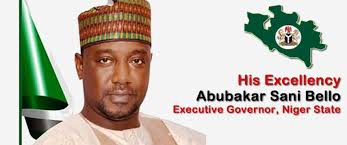
Since its creation in 1976, Niger State has been known solely for its large land mass. Over the years, many Nigerians and foreign bodies began to identify Niger as a crisis-torn state, especially with the influx of banditry and terrorist attacks.
However, a recent report by the Nigerian National Bureau of Statistics pinpointed Niger as the 4th largest destination of capital investment in Nigeria with up to $16.4 million.
So what changed? How did Niger State evolve from being a primarily civil service state known only for its land mass to an economic giant?
The answer is simple: Gov Abubakar Sanu Bello. Bello emerged as the governor of Niger State in 2015 with a landslide victory. Shortly after he stepped into office, he took the proverbial bull by the horn and began a developmental onslaught that swept across all sectors and has resulted in the Niger State that we currently know.
In 2018, at the NACC-SME Conference Training Workshops, the governor identified SMEs as a catalyst to economic development within the state and Nigeria as a whole. Subsequently, he made a call for the development of Nigerian SMEs in order to create more job opportunities and enhance the nation’s economy.
However, Bello’s passionate speech which addressed the need for economic development was not all fluff. Since his election into office in 2015, the governor has taken great strides to fulfill his mandate and electoral promises.
Below is a breakdown of his most recent track record of policies which have played a huge part in fanning the embers of Niger State’s shocking economic growth:
THE NIGER STATE URBAN POLICY (SUP)
In 2020, the Niger State government, under the leadership of Bello, unveiled its blueprint for an urban policy to stimulate a paradigm shift in the urban management of the state.
The policy was targeted at addressing several issues including but not limited to: education, agriculture, social development, road and rail transportation network, green economic development and enhancing internal revenue generation potentials of the state and LGAs.
The policy also aimed at upgrading slums and ensuring that young people within the state are provided with adequate opportunities to participate fully in the affairs of the state.
THE NEW STATE WATER AND SEWERAGE CORPORATION
In May 2020, Governor Abubakar Sani Bello signed a bill establishing a new State Water and Sewerage Corporation into law. The corporation replaced the existing state Water Board and was targeted at improving urban water delivery and sanitation services within the State.
The implication of this new corporatization bill is the outlining of a framework for sludge management and service delivery, subsequently leading to broad-based economic growth and community resilience.
Niger State’s journey to economic growth has come as a great shocker to many, especially with its clinching of the 4th position on the NBS’ list of top destinations of capital investment in Nigeria.
One would expect that the oil-producing states will swoop the top positions, leaving other states like Niger to eat the dust.
However, despite the numerous hurdles and obstacles that would deter any ordinary man, Gov Bello has gone ahead to completely transform Niger’s economy and turned the state into an economic giant.
Seun Oloketuyi writes from Lagos.









